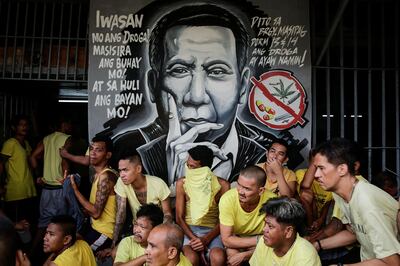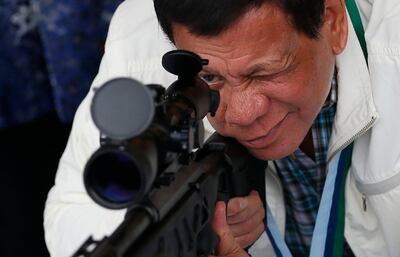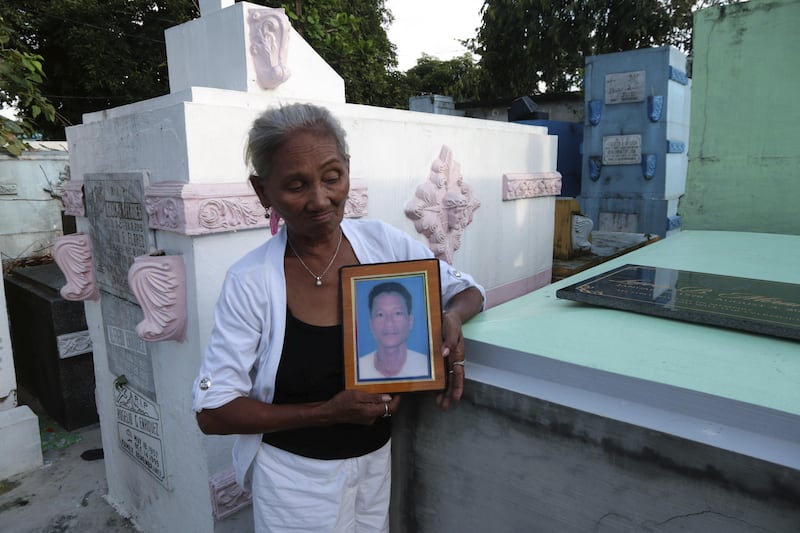Manila // On an overcast day, the 70-year-old Elvira Miranda stands next to an opulent grave in Manila's North Cemetery and points to the concrete patch among the tombstones where her son was gunned down.
A slight figure bent from years of hardship, her face frozen in a perpetual frown, the grey haired widow recounts how Leover Miranda had come to visit her on the graveyard on August 3, where she and an estimated 5,000 squatters live among the dead.
Unfortunately for Leover, a 39-year-old man suffering from mental illness, he came across the police after leaving his mother's hut, who arrested and handcuffed him. Leover's explanation for what he was doing in the graveyard at night failed to convince, sealing his fate. Suspecting him to be a petty drug dealer or addict, the officers shot him dead.
Mrs Miranda denies that her son was involved in drugs.
"My son is innocent. He was helpless," she says with a feeble voice.
Dressed in an immaculately white blazer and shorts, she belies her age as she moves nimbly through an obstacle course of graves, bushes and trees until she reaches her home, a tiny hut fashioned out of corrugated tin and plywood.
From the dark, cramped inside, she fetches a marble plaque neatly inscribed with Leover's name, the date of his birth, and of his death. It was all she could afford to commemorate her son.
The police frequently patrol the graveyard, where house-like tombs provide the deceased with a luxurious final resting place, and the squatters live in small shacks perched in between these extravagant structures.
Just like the funeral processions which deliver new inhabitants to the tombs, the police bring death with them.
"People die here every other day," says Romelito Jimenez, the husband of Mrs Miranda's niece. Mr Jimenez, who also lives in the cemetery, says a cousin of his wife was killed by the police just two weeks later for occasionally smoking "shabu", as crystal meth is known in the Philippines.
The poorest of the poor, the squatters of the North Manila Cemetery are easy prey in the murderous anti-narcotics campaign waged by president Rodrigo Duterte. The ruthless president pledged to solve the country's drug problem by force, and the police, vigilante groups and mysterious death squads went to work soon after his inauguration in June last year.

The police admits to killing more than 3,900 "drug personalities" since then. Activists say the dead are mainly small time dealers and addicts, or simply innocent victims, and put the actual death toll at 13,000. The brutal strategy of eradicating drug use through death and intimidation has plunged the slums of Manila and other cities into violent chaos.
"They're talking about a campaign against drugs but most of the victims are innocent, poor people who can't defend themselves," says Benjamin Cordero, an activist for the Stop the Killing campaign. "Whenever you kill, innocent poor people you didn't kill the drugs, you kill the poor."
It was the poor who propelled Duterte to victory in last year's presidential elections, and initially his crackdown on drugs was popular with his electoral base. But the president had claimed he would eliminate drug use within six months, and the longer the killing spree continued, the clearer it became that his approach was failing while continuing to claim lives.
Over the summer, a series of execution-style killings of unarmed teenagers by the police caused public outrage, and fanned opposition to Duterte's crackdown.
________________
Duterte's drug war
Church bells to ring in protest against Philippine drug killings
Duterte's son denies Philippine drug smuggling claims
Philippines president considering martial law in response to protests
________________
The most notorious case, the police killing of 17-year-old Kian Santos in August, also marked another significant turning point. When police officers came to pick up two terrified witnesses of the incident at the San Roque Cathedral in Manila, where they had fled for fear of their safety, the bishop refused to hand them over. This act of defiance made the headlines, and signalled a shift in the position of the influential Catholic Church.
When launching his bloody campaign against drugs, Mr Duterte shrewdly attacked the church to forestall any criticism, focusing on child abuse scandals that had tarnished its reputation. Afraid to pit itself against the popular president, the church remained silent as the bodies mounted.
"The church's response at the beginning of the Duterte administration was quite timid, to put it mildly. From the moment he stepped into the office, Mr Duterte started firing at the church, putting it on the defensive. And it worked," says Carlos Conde, the Philippines researcher for Human Rights Watch.
Over 81 per cent of Filipinos are Roman Catholic, and the church leveraged its sway over a deeply religious society into becoming a key player in the resistance movement that eventually toppled dictator Ferdinand Marcos in 1986.
It is now beginning to stand up to Mr Duterte too. The Catholic Bishops' Conference of the Philippines (CBCP) in mid-September mandated that churches ring their bells every evening for forty days to remind of the victims of the president's war on drugs.
A week later, CBCP's president Socrates Villegas delivered a scathing criticism of Mr Duterte during a homily held in Manila, telling the congregation that "we are losing our national soul to the Father of Lies and Prince of Darkness."
As the church is finding its voice, polls suggest that Duterte's core constituency has become alienated by the killings.

A public opinion survey conducted in September found Mr Duterte's approval ratings had slumped. The president saw net satisfaction rating falling 18 points to 48, according to Philippine pollster Social Weather Stations.
The Commission on Human Rights, a Philippine government body, believes that the decline shows the country's poor are fed up with the terror wrought on their communities.
"Filipinos in lower socio-economic classes tend to suffer more — and yet no one has been held accountable for any of these killings," the commission said.
However, a poll published this week by Pulse Asia showed the war on drugs still had broad support with nearly nine out of 10 Filipinos supporting the crackdown.
On October 12, the president responded to mounting criticism and waning support pulling the national police out of the anti-narcotics drive, leaving the Philippine Drug Enforcement Agency, which makes up only one per cent of the police force, to conduct all official operations.
With the bulk of the police force no longer engaged in the crackdown, the amount of deaths are likely to reduce substantially.
But the move comes too late for Mrs Miranda, who is stricken by grief over the loss of her son.
After placing Leovers plaque on a grave, she loses her composure as the tears well up.
"I cry every day," she says.





